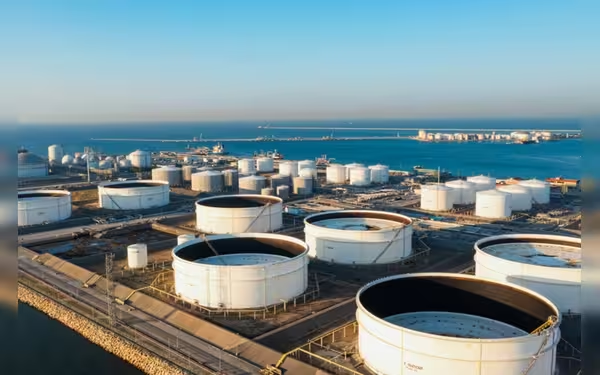Saturday, November 16, 2024 03:18 PM
Saudi Arabia Increases Crude Oil Production to 8.94 mbpd
- Saudi Arabia's crude production rises to 8.94 mbpd.
- Crude oil exports decline by 5.06 percent.
- Direct crude usage surges by 37.8 percent.
 Image Credits: arabnewspk
Image Credits: arabnewspkSaudi Arabia's crude oil production rises to 8.94 mbpd, while exports decline. Direct crude usage surges significantly amid rising domestic demand.
Saudi Arabia, a key player in the global oil market, has recently reported an increase in its crude oil production. In July, the Kingdom's output rose to 8.94 million barrels per day (bpd), marking a 1.26 percent increase from June. This uptick in production is significant, especially as the country navigates the complexities of global oil demand and supply dynamics.
Despite the rise in production, Saudi Arabia's crude oil exports experienced a decline, falling to 5.74 million bpd, which represents a decrease of 5.06 percent. This drop in exports could be attributed to various factors, including changes in domestic demand and international market conditions. Interestingly, domestic petroleum demand saw a boost, increasing by 79,000 bpd to reach 2.83 million bpd. This suggests that while the Kingdom is producing more oil, it is also consuming more of it internally.
During a recent virtual meeting of OPEC+ members, which took place on September 5, countries reaffirmed their commitment to the voluntary production cuts that were previously announced in April and November 2023. The eight OPEC+ nations, including Saudi Arabia, Russia, and Iraq, emphasized the importance of adhering to these agreements. Iraq and Kazakhstan specifically pledged to follow the compensation schedules they submitted to the OPEC Secretariat after the April meeting, showcasing a united front among member countries.
Data from the Joint Organizations Data Initiative (JODI) revealed that refinery crude exports dropped by 17 percent to 1.13 million bpd. The primary products exported included processed crude used for diesel, motor and aviation gasoline, and fuel oil. Notably, diesel constituted 43 percent of refined product exports, while motor and aviation gasoline accounted for 30 percent, and fuel oil made up 8 percent. Interestingly, despite its smaller share, fuel oil shipments surged by 20 percent, reaching 343,000 bpd.
In July, Saudi Arabia's refinery oil products output reached 2.46 million bpd, which is a 2 percent decrease from the previous month. Diesel continued to dominate the output, accounting for 44 percent, followed by motor and aviation gasoline at 28 percent, and fuel oil at 17 percent. According to TechSci Research, the Kingdom's oil refining market was valued at $27 billion in 2023 and is expected to grow at a compound annual growth rate of 4.7 percent through 2029. This growth is crucial for Saudi Arabia as it seeks to enhance its refining capacity and integrate advanced technologies into its operations.
As global demand for refined products such as gasoline, diesel, jet fuel, and petrochemical feedstocks continues to rise, Saudi Arabia is actively modernizing its infrastructure and constructing new refineries. These strategic advancements are essential for maintaining the Kingdom's position as a leading global producer of refined petroleum products, catering to the increasing needs of transportation and industrial sectors worldwide.
Moreover, Saudi Arabia's direct burn of crude oil saw a significant increase, rising by 211,000 bpd to a total of 769,000 bpd. This marks a substantial 37.8 percent rise compared to the previous month. Year-over-year, direct crude usage was up by 177,000 bpd, reflecting a 30 percent increase. This surge in direct crude utilization is likely driven by rising energy demands linked to population growth and an influx of newcomers to the country. It highlights both increased domestic consumption and the ongoing development of residential and business sectors, which contribute to the growing energy needs in Saudi Arabia.
To address peak summer electricity demand, Saudi Arabia imported fuel oil from Kuwait in July for the first time in over two years. This decision was prompted by a decline in discounted fuel supplies from Russia, leading the Kingdom to seek alternative energy sources to ensure a stable power supply during the hottest months. This move underscores the importance of adaptability in energy strategies, especially in a rapidly changing global landscape.
Saudi Arabia's recent developments in crude oil production and refining highlight the Kingdom's ongoing efforts to balance domestic needs with international market demands. As the global energy landscape continues to evolve, Saudi Arabia's strategic decisions will play a crucial role in shaping its future as a leading oil producer. The Kingdom's commitment to modernization and capacity expansion will be vital in meeting both current and future energy demands, ensuring its position in the global market remains strong.













